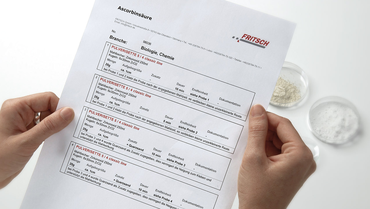Back to overview
Processing selenium in the laboratory
The following interesting statements are found at Wikipedia:
- Several modifications exist
- Selenium is considered a semi-metal
- Above 60° C a glass like modification occurs
- The forming above 80° C grey, semi-metal modification is the most stable form
- Selenium occurs in nature as a native metal
- Melting point 221° C
- Mohs hardness 2
The Task
The provided sample was ultra-pure selenium. In order to comminute this sample, the Planetary Mono Mill PULVERISETTE 6 classic line was equipped with the 250 ml zirconium oxide grinding bowl and 15 x 20 mm grinding balls were chosen. Although we recommend in our technical documents a maximum feed size of 10 mm, the chunks shown in the photo are clearly larger though. For the pre-comminution no technology was available which excluded a contamination. Therefore the sample was added as shown.
Results after 5 minutes comminution
After a processing of 5 minutes at a maximum rotational speed (650 rpm), it was assessed and exactly as expected, a fine powder with several, few rough chunks was found. On the photo those are seen next to the coin (comparison of size) and on the lower rim of the photo. These chunks were sorted out and the remaining sample was ground further.
Grinding results
-
Download the FRITSCH-report as PDF file
-
Detailed grinding reports
-
Additional literature
Back to overview








